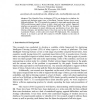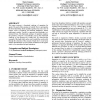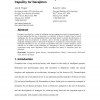388 search results - page 23 / 78 » Mind the (Intelligibility) Gap |
CLASSIFICATION
2010
13 years 5 months ago
2010
: The issue of determining "the right number of clusters" in K-Means has attracted considerable interest, especially in the recent years. Cluster intermix appears to be a...
ICDM
2010
IEEE
13 years 5 months ago
2010
IEEE
Traveller information, route planning, and service updates have become essential components of public transport systems: they help people navigate built environments by providing a...
AIED
2005
Springer
14 years 1 months ago
2005
Springer
The eXtensible Tutor Architecture (XTA) was designed as a platform for creating and deploying many types of Intelligent Tutoring Systems across many different platforms. The XTA pr...
ATAL
2005
Springer
14 years 1 months ago
2005
Springer
This paper proposes a functional ontology of reputation for agents. The goal of this ontology is twofold. First, to put together the broad knowledge about reputation produced in s...
IJSR
2011
13 years 2 months ago
2011
Deception is utilized by a variety of intelligent systems ranging from insects to human beings. It has been argued that the use of deception is an indicator of theory of mind [2] ...



